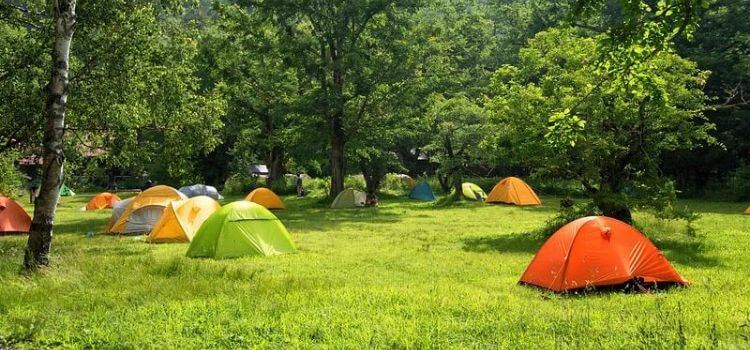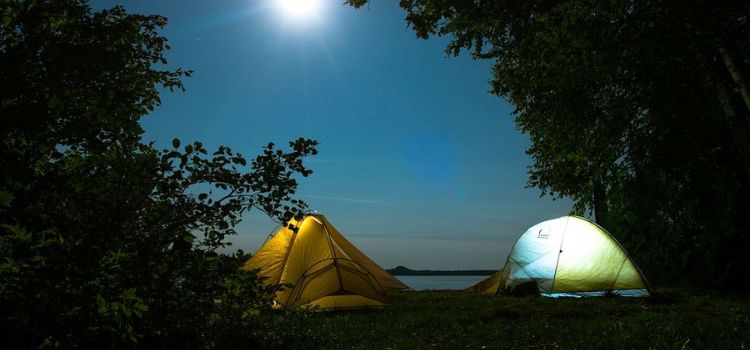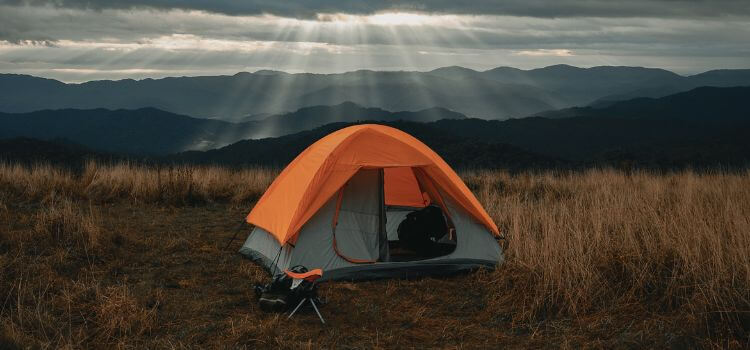As an Amazon Associate, I earn from qualifying purchases
A spike camp is a temporary camp for backcountry hunters that reduces pack weight and distance to camp, providing a comfortable and convenient base for hunting expeditions. With its versatile advantages, a spike camp offers hunters the best chance to hunt successfully while still being comfortable and allows them to be in prime areas at daybreak without requiring breaking trail by moonlight and risking spooking game.
This type of camp is different from a base camp where hunters return to each evening, as outpost camps require packing up each morning and making camp each night. Whether it’s in cowboy terms or used in wildland firefighting operations, a outpost camp serves as a smaller camp separate from the main camp, providing support in remote areas that require personnel to travel extended distances.
What Is A Spike Camp?

A spike camp is a temporary campsite that is set up in the backcountry, usually during a hunting or wilderness expedition. It is a secondary camp that is located at a distance from the main camp and serves as a base for hunters or outdoor enthusiasts to explore and stay closer to their target areas.
Definition Of A Spike Camp
A outpost camp, also known as a secondary camp, is a temporary camp that is set up in the backcountry. It is typically located away from the main camp, allowing hunters or outdoor enthusiasts to establish a base closer to the target areas they want to explore.
Purpose Of A Spike Camp
The main purpose of a outpost camp is to provide a convenient and strategic location for hunters or outdoor enthusiasts. By setting up a secondary camp closer to the desired areas, they can minimize the distance they need to travel and reduce pack weight during their expeditions. This allows them to spend more time in productive hunting zones or explore different regions without the need to return to the main camp.
Advantages Of A Spike Camp
A outpost or spike camp offers several advantages for hunters and outdoor enthusiasts:
- Reduced Travel Distance: By staying in a outpost camp closer to their target areas, hunters can minimize the distance they need to travel each day. This saves time and energy, allowing them to focus on their activities.
- Increased Time in Productive Zones: Setting up a outpost camp allows hunters to spend more time in areas where they are likely to encounter their desired game. This increases their chances of success and provides a better overall hunting experience.
- Flexibility and Mobility: With a outpost camp, hunters have the flexibility to move and explore different regions without the need to return to the main camp. This allows them to adapt to changing weather conditions, game patterns, or any other factors that may influence their hunting strategy.
- Reduced Pack Weight: Since hunters only need to carry essential gear and supplies to the outpost camp, they can reduce the weight of their backpacks, making it easier to navigate through rugged terrains and challenging environments.
- Closer to Nature: A outpost camp provides a unique opportunity for hunters to immerse themselves in the wilderness and experience the beauty of nature up close. It allows them to appreciate the sights, sounds, and serenity of the backcountry.
Difference Between Spike Camp And Base Camp

A spike camp and a base camp are two types of campsite setups commonly used by outdoor enthusiasts, backpackers, and hunters. While both serve the purpose of providing shelter during an outdoor adventure, they differ in various ways. Understanding the difference between a spike camp and a base camp will help you determine which option suits your needs best.
Definition Of Base Camp
A base camp is a central and permanent campsite where outdoor enthusiasts return each evening after exploring the surrounding areas. It serves as a home base, providing a sense of comfort, stability, and convenience. Base camps are typically set up in areas with access to essential facilities such as water sources, cooking areas, and sanitary facilities.
Definition Of Spike Camp
A outpost camp, on the other hand, is a temporary campsite that is established away from the base camp. It is designed to be lightweight, portable, and easily transportable, allowing outdoor enthusiasts to move freely and efficiently. Spike camps are set up closer to the target destinations, reducing the need to carry heavy backpacks for long distances.
Pros And Cons Of Base Camp
| Pros | Cons |
|---|---|
| Provides comfort and stability | Requires a larger setup and more equipment |
| Easy access to necessary facilities | May limit mobility and exploration |
| Allows for a larger group setup | Can be crowded during peak seasons |
Pros And Cons Of Spike Camp
| Pros | Cons |
|---|---|
| Lightweight and portable | May lack certain comforts and amenities |
| Enables easy mobility and exploration | Requires setting up and packing up each day |
| Reduces the need to carry heavy backpacks | May limit the size of the group |
Both base camps and spike camps offer unique advantages and drawbacks, and choosing between them depends on your preferences, goals, and the specific requirements of your outdoor adventure. Consider the distance, terrain, duration, and the level of comfort and mobility you desire to make an informed decision.
Having a clear understanding of the differences between spike camps and base camps will help you plan your outdoor adventure effectively, ensuring a successful and enjoyable experience.
Tips And Essentials For A Successful Spike Camp

A outpost camp is a temporary camp for backcountry hunters that reduces pack weight and distance to camp. It is an essential tool for successful hunting, providing comfort and increasing chances of a successful hunt. Ensure you have all the essential gear and follow these tips for a smooth spike camp experience.
Choosing The Right Location
When it comes to spike camping, choosing the right location is essential for a successful experience. Consider the terrain, accessibility, and proximity to your hunting grounds. Look for areas with ample water sources, suitable shelter options, and a good vantage point for scouting and spotting game. Research your chosen area beforehand and gather information on potential hazards or restricted areas that could affect your camping plans.
Packing For A Spike Camp
Packing smartly and efficiently is crucial when setting up a spike camp. Prioritize lightweight gear and essentials that will meet your basic needs. Start with a lightweight backpack that fits comfortably and has enough capacity for all your gear. Waterproof matches or a lighter for fire starting, a compact fire kit, sleeping bags, and a suitable shelter are essential items. Pack enough food for the duration of your spike camp and consider lightweight, calorie-dense options that won’t weigh you down. Organize your gear in separate bags or compartments for easy access and efficient packing.
Setting Up A Spike Camp
When setting up a spike camp, location and comfort are key. Identify a flat area free from hazards such as falling rocks or dead trees. Clear the ground of any debris, rocks, or sharp objects that could impact your setting. Consider using a lightweight tent or a hammock for shelter and attachment points for your gear. Secure your shelter properly to withstand wind and rain. Create a designated cooking area away from your sleeping area to prevent odors from attracting wildlife. Remember to comply with Leave No Trace principles and leave the campsite exactly as you found it.
Managing Supplies And Food
Managing supplies and food is crucial for a successful spike camp. Prioritize water management by carrying a portable water filter or purifying tablets to ensure a clean and abundant water supply. Stock up on lightweight, nutrient-dense foods that require minimal cooking or preparation. Plan your meals ahead and divide them into separate, lightweight containers or resealable bags for easy access and portion control. Properly dispose of food waste and store all remaining food securely to avoid attracting wildlife. Regularly assess your supplies and replenish them when necessary.
Frequently Asked Questions For What Is A Spike Camp
What Is A Spike Camp In Cowboy Terms?
A spike camp in cowboy terms is a temporary camp used by backcountry hunters or forestry crews. It is separate from the main camp and provides convenience and flexibility in accessing remote areas.
What Is A Cowboy Spike Camp?
A cowboy spike camp is a temporary campsite for backcountry hunters, reducing pack weight and distance to camp. It is also a secondary camp for forestry crews, accessible from the main camp.
What Is A Spike Camp In Yellowstone?
A spike camp in Yellowstone refers to a temporary or secondary campsite that is located at a distance from the main camp but can still be easily accessed. Originally, the term was used by deer hunters who wanted to be in prime areas at daybreak without needing to break trail in the dark.
What Is The Difference Between Base Camp And Spike Camp?
A base camp is where you return each evening, while a spike camp requires packing up each morning and making camp each night.
Conclusion
A spike camp is a temporary campsite that provides backcountry hunters with a versatile and efficient way to reduce pack weight and decrease the distance to the camp. This type of camp allows hunters to be closer to prime hunting areas, making it easier to navigate and increase their chances of a successful hunt.
By setting up a spike camp, hunters can enjoy the benefits of a comfortable camp while still maintaining mobility and flexibility. So, if you’re planning a backcountry hunting trip, consider the advantages of a spike camp and the essentials you’ll need for a successful adventure.
Read More
How to Insulate a Tent for Winter Camping
How to Wash Dishes While Camping
As an Amazon Associate, I earn from qualifying purchases

